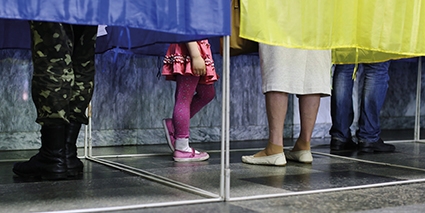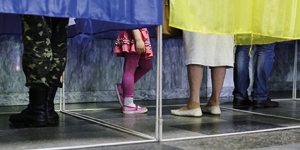Ukraine Now Experiences What Georgia Saw Years Ago
Ukraine is bracing itself for the upcoming elections on March 31. The results of said elections could have major repercussions on both Ukraine’s internal developments and the surrounding region as the country struggles to keep its territorial integrity in the view of Russian military and economic moves in eastern Ukraine and the Black and Azov seas.
Surprisingly, the polls conducted in February gave 41-year-old Zelensky 25% of the vote, a 10-point lead over incumbent Petro Poroshenko and political veteran Yulia Timoshenko, who are also running for office in the national election.
The popularity of the current leader of the race reflects the thinking of many Ukrainians nowadays and their deep mistrust towards the ruling political elite. Zelensky is associated with one of the powerful Ukrainian oligarchs, Ihor Kolomoyskiy, who recently also endorsed him publicly.
Despite numerous allegations that his government has been marred in deep corruption, it was still under Poroshenko that Ukraine saw a veritable divorce with Russia in almost every aspect of geopolitics.
In the last five years since the Ukraine crisis broke out following the annexation of the Crimean Peninsula, Kiev has managed to reinforce the Ukrainian army amid ongoing conflict and contain the conflict with Russia to eastern Ukraine and the Azov Sea.
Ukraine also ratified the Association Agreement with the European Union, the non-signing of which actually deposed the former president Viktor Yanukovych. Moreover, Ukraine also got visa-free access for its citizens to the EU (except for the UK and Ireland) and four other Schengen-associated countries.
Recently, Ukraine’s Orthodox Church gained autocephaly (independence) from the Russian Church.
Beyond this, Ukraine’s trade has been redirected to Europe rather being mostly dependent on Russia, as was the case before 2014.
Thus, it is highly unlikely that Ukraine’s foreign policy will change if Zelensky wins: there are simply too many economic, military and ideological strides that now connect the country to the West.
In addition, there is also a very simple reason why Ukraine is unlikely to become pro-Russian or even try to be neutral. The very fact that Russia has taken away Crimea and supports the separatist elements in eastern Ukraine will always keep Kiev’s willingness to cooperate deeper with the West. And this is a major flaw in the Russian strategy. Moscow is simply pressing too hard on Ukraine, leaving very little, if any, possibility for improvement in the relations or hope that Kiev will abandon its pro-Western path.
It is like what Georgia experienced a decade ago. Where, before the 2008 Russo-Georgian War, some sections of the Georgian political and cultural elite argued that it would still be possible to work with the Russians and maybe even get back control of Abkhazia and the Tskhinvali region, in 2008 these legitimate hopes were dashed. In other words, the Russians dissipated hopes among Georgians for a geopolitical rapprochement with Moscow.
True, Moscow has been able to hinder Georgia’s NATO and EU accession. True, Ukraine’s aspirations hit the same problem. But the Russian strategy shows that Georgia and Ukraine’s populations have become increasingly pro-western. In other words, Russia nowadays has a similar understanding of things as in the 1990s, but under Boris Yeltsin, the policy towards Georgia and Ukraine was more practicable, leaving space for diplomacy and giving hope to Tbilisi and Kiev that it would be possible to at least keep its territorial integrity in exchange for being pro-Russian.
It is still surprising why the modern Russian foreign policy is not subject to serious questions. Receding Russian influence has already become a trend. The preclusion of Georgia and Ukraine from entering NATO/EU might last for years or even decades, but the willingness of the Georgians and Ukrainians to see their countries with Russia is dying out much faster.
By Emil Avdaliani
Photo by Dan Kitwood/Getty Images












